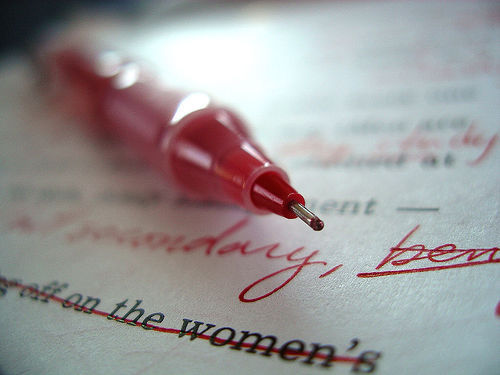Editing

Some fellow authors and readers have been asking me about the "editing process" with a traditional book deal, so I'm going to describe it here. This process is particular to me and my editor and might vary with others.
So. I finished Last Light, book two in the Night Owl Trilogy. I proofed it three times on my own. I checked for inconsistencies in the story, weak motives, dragging plot, and all the technical junk -- typos, grammatical issues, tense changes, etc.
When I felt confident with my manuscript, I emailed the first draft to my agent and editor. And I waited.
This process is as agonizing as waiting to hear back from agents, or waiting to hear from your agent as he or she submits your book to publishers.
Why is it agonizing? Because, when an editorial house buys your books, they are buying a say in the final product which they must sell. And by "a say" I mean -- my editor has every right to read Last Light and ask me to rewrite the entire novel if it doesn't jive with her vision for the book, or if she feels she can't sell the story.
Nightmarish, I know.
But... that's part of a traditional deal, and that's what I went in for. There comes a point when, as writers, we get so close to our stories that we can no longer distinguish the good from the bad -- the strong chapters from the weak. That's part of why I signed a deal -- part of why I went traditional. I wanted that editorial input. I wanted to give you the strongest story I can write.
Fortunately for me, my agent and editor loved Last Light and had small editorial suggestions for the beginning and end of the novel, and requested some heavier edits to make the final third more dramatic. ("Heavier edits" = rearranging and rewriting scenes, deleting scenes (hint -- you'll probably get to see these), writing two or three new chapters, and re-combing the book for inconsistencies.)
When my editor outlined the book's major problems, I saw them clearly for the first time. I'd felt those problems, struggled with a diffuse denouement, but I could no more address them than I could articulate them. I didn't feel insulted by the edits suggested. I didn't feel I was losing control of my story. Most importantly, I didn't feel that my vision for the story was being lost or overwhelmed. Rather, I felt that my editor was helping me give clearer shape to my vision. And that's what a writer-editor relationship should do.
The next step is editing. Taking my editor's notes (and my agent's notes) and making changes to Last Light. Proofing, rereading, rewriting, rearranging. When I like the look of the second draft, I will send it to them (again). And they will suggest edits (again). And I will revise (again). And this process will continue until my editor "accepts" the manuscript -- at which time, ideally, we both feel the novel is as sound and well-rounded as it can be.
Moral of the story: This process -- the editorial process -- is what I feared most about my book deal, and now that I am moving through it, I am humbled and grateful and I have zero regrets about taking the deal. If I were still self-publishing, I would have taken my current first draft of Last Light and published it -- not because I'm a lazy editor, but because I was incapable of seeing some of the book's major pitfalls. I'm truly appreciative of my editorial team, because I want to give you a great book, not just a good book.



